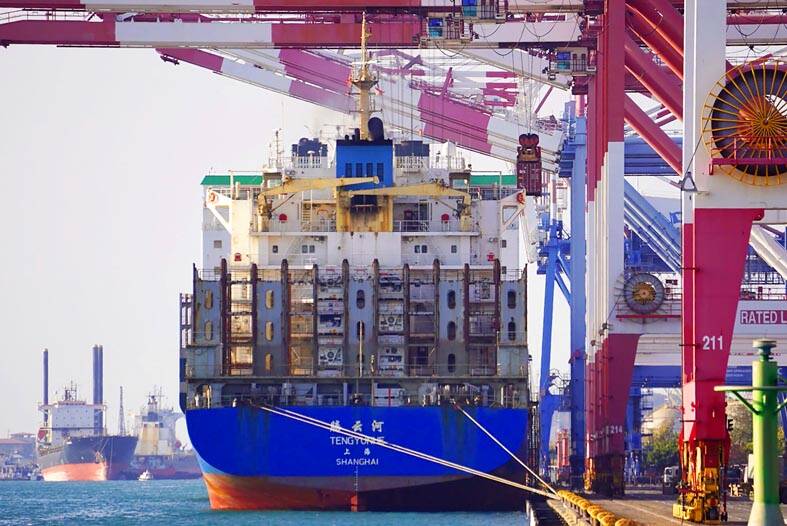Container cargo shipper Yang Ming Marine Transport Corp (陽明海運) is to give its employees an average mid-year bonus of about NT$1.34 million (US$43,802) per person after posting a net profit of more than NT$180 billion last year.
Most Taiwanese companies are expected to give workers smaller mid-year bonuses this year, but those in the shipping industry are to reward their employees with big bonuses after reporting strong profitability in the past year.
In a statement, Yang Ming Marine said the bonuses were being issued based on the company’s charter, which requires it to pay no less than 1 percent of its profits as mid-year bonuses to employees.

Photo: CNA
The company posted record net profit of NT$180.6 billion for last year, up 9.32 percent from a year earlier, while its consolidated sales also hit a high of NT$375.9 billion, up 12.6 percent from a year earlier.
Based on the NT$50,000 average monthly salary of Yang Ming Marine employees, the mid-year bonuses are expected to equal 26 to 27 months of salary and total NT$2.329 billion.
Yang Ming last week proposed to distribute a cash dividend of NT$20 per share after reporting earnings per share (EPS) of NT$51.71 last year, up from NT$48.28 in 2021. That translates into a payout ratio of 38.68 percent.
EVERGREEN
On Tuesday, bigger rival Evergreen Marine Corp (長榮海運) said it would distribute NT$1.918 billion in mid-year bonuses.
Evergreen Marine’s planned bonuses were about equal to 10 to 11 months of the average monthly salary of NT$60,000 for its 3,100 employees, after the company posted record net profit of NT$334.2 billion for last year, up 39.82 percent from a year earlier.
With EPS of NT$87.07, the shipper announced on Tuesday that it was proposing a cash dividend of NT$70 per share, equal to a payout ratio of about 80.4 percent.
WAN HAI
Wan Hai Lines Ltd (萬海航運), which did not perform as well last year as its two local rivals, plans to give its employees a total of NT$744 million in mid-year bonuses, but it did not provide employee numbers, making it hard to gauge the size of the bonus relative to average pay.
The company’s net profit last year fell 9.9 percent to NT$93.07 billion after Wan Hai reported a net loss in the fourth quarter. It has proposed paying a cash dividend of NT$5 per share based on its EPS of NT$33.17, a 15.07 percent payout ratio.
Wan Hai’s fourth-quarter loss and falling international container shipping rates were signs that the high demand of the past two years, when containers were in short supply and freight rates soared, has come to an end.
Evergreen Marine president Eric Hsieh (謝惠全) on Tuesday said that the global shipping industry could weaken in the first quarter before rebounding in the second quarter.
Any real comeback would have to wait until the second half of the year, with the key to the recovery hinging on the end of the war in Ukraine, Hsieh said.

TAKING STOCK: A Taiwanese cookware firm in Vietnam urged customers to assess inventory or place orders early so shipments can reach the US while tariffs are paused Taiwanese businesses in Vietnam are exploring alternatives after the White House imposed a 46 percent import duty on Vietnamese goods, following US President Donald Trump’s announcement of “reciprocal” tariffs on the US’ trading partners. Lo Shih-liang (羅世良), chairman of Brico Industry Co (裕茂工業), a Taiwanese company that manufactures cast iron cookware and stove components in Vietnam, said that more than 40 percent of his business was tied to the US market, describing the constant US policy shifts as an emotional roller coaster. “I work during the day and stay up all night watching the news. I’ve been following US news until 3am

UNCERTAINTY: Innolux activated a stringent supply chain management mechanism, as it did during the COVID-19 pandemic, to ensure optimal inventory levels for customers Flat-panel display makers AUO Corp (友達) and Innolux Corp (群創) yesterday said that about 12 to 20 percent of their display business is at risk of potential US tariffs and that they would relocate production or shipment destinations to mitigate the levies’ effects. US tariffs would have a direct impact of US$200 million on AUO’s revenue, company chairman Paul Peng (彭雙浪) told reporters on the sidelines of the Touch Taiwan trade show in Taipei yesterday. That would make up about 12 percent of the company’s overall revenue. To cope with the tariff uncertainty, AUO plans to allocate its production to manufacturing facilities in

Six years ago, LVMH’s billionaire CEO Bernard Arnault and US President Donald Trump cut the blue ribbon on a factory in rural Texas that would make designer handbags for Louis Vuitton, one of the world’s best-known luxury brands. However, since the high-profile opening, the factory has faced a host of problems limiting production, 11 former Louis Vuitton employees said. The site has consistently ranked among the worst-performing for Louis Vuitton globally, “significantly” underperforming other facilities, said three former Louis Vuitton workers and a senior industry source, who cited internal rankings shared with staff. The plant’s problems — which have not

COLLABORATION: Given Taiwan’s key position in global supply chains, the US firm is discussing strategies with local partners and clients to deal with global uncertainties Advanced Micro Devices Inc (AMD) yesterday said it is meeting with local ecosystem partners, including Taiwan Semiconductor Manufacturing Co (TSMC, 台積電), to discuss strategies, including long-term manufacturing, to navigate uncertainties such as US tariffs, as Taiwan occupies an important position in global supply chains. AMD chief executive officer Lisa Su (蘇姿丰) told reporters that Taiwan is an important part of the chip designer’s ecosystem and she is discussing with partners and customers in Taiwan to forge strong collaborations on different areas during this critical period. AMD has just become the first artificial-intelligence (AI) server chip customer of TSMC to utilize its advanced